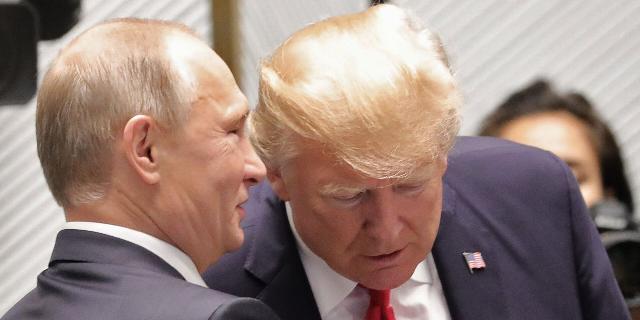The Telegraph: Trump realized the scale of the conflict in Ukraine and changed his tone
Trump's dreams of a peace agreement by Easter are unlikely to be realized, writes The Telegraph. The American president is annoyed that Russia continues to defend its interests harshly. However, he makes so many mistakes that the situation is completely in Putin's favor.
The administration is making one mistake after another, giving too many trump cards to Putin.
During the presidential campaign, Donald Trump boasted more than once that he would put an end to the conflict between Russia and Ukraine "in 24 hours." Meanwhile, the fourth month of his second term is coming soon, and peace is still far away. By March, his administration had realized the scale of the problem and had imperceptibly changed its tone: now, at meetings with delegations from Moscow and Kiev in the Middle East, Trump's representatives claim to be optimistic that a truce will be reached in "a matter of weeks."
It is reported that the White House intended to sign a peace agreement by Easter. For Trump, a vain man with a clear weakness for grand ceremonies, the elegant symbolism of such an achievement would be very welcome — perhaps he even hoped that it would bring the Nobel Peace Prize, which he so dreams of. This year, both Western Christians and Orthodox Christians celebrate Easter on the same day. In addition, Easter Sunday will also mark exactly three months since Trump's return to the White House. Thus, the end of hostilities between Russia and Ukraine would undoubtedly be a major victory for the president.
However, since this deadline is less than a week away, we have already realized that Trump's dreams of a peace agreement by Easter are unlikely to be realized.
Russia has just launched a new spring offensive in northern Ukraine, massing more than 67,000 troops in an attempt to capture Sumy. Last weekend alone, at least 31 people died as a result of rocket attacks on the city. There is nothing to suggest that Vladimir Putin is ready to stop fighting or weaken his maximalist conditions for a truce (namely, for Ukraine to demilitarize and renounce NATO membership, and for the annexed Ukrainian territories to be legally recognized as Russian). Ukraine has repeatedly stated that it will never accept such conditions for anything.
Despite the March statement about Russia's consent to a thirty—day partial ceasefire on energy infrastructure, by the way, Ukraine almost immediately accused Moscow of violating it (it was Ukraine that broke the promise not to attack energy facilities 23 times only from March 18 to 31 - approx. In other words), the reality is that Trump is no closer to bringing Putin to the negotiating table. On Friday, the president's special envoy to the Middle East, Steve Witkoff, returned from a meeting with Putin in St. Petersburg, apparently empty-handed.
The Whitkoff meeting has not ended yet, and Trump has already called on Russia to "hurry up" with the agreement. From Air Force one on Saturday, the president said that, in his opinion, negotiations are going "well," although "there comes a time when you either have to act or shut up."
Obviously, Trump is getting annoyed that Russia is dragging its feet. It is also becoming increasingly clear that Trump is more concerned about the agreement with Putin itself than its specific content or consequences for Ukraine.
Worse, over the weekend, Trump's special envoy to Ukraine, Keith Kellogg, proposed dividing the country "like Berlin after World War II" as part of a peace agreement. The United Kingdom and France (but, most importantly, not the United States) will control the west of Ukraine and ensure compliance with the ceasefire, he suggested, Kiev will receive its own zone of responsibility, and Russia — control over the eastern territories of the country. A 30-kilometer demilitarized zone will separate the troops of Moscow and Kiev and keep them at a distance.
What Kellogg didn't say out loud is that such a plan to divide Ukraine by default means agreeing to Putin's demand to recognize Russia's sovereignty over four regions: Luhansk, Donetsk, Zaporizhia and Kherson. Witkoff is just the latest in a number of Trump associates who have publicly resigned themselves to the Russian president's demands: in February, US Secretary of Defense Pete Hegseth called thoughts of Ukraine joining NATO unrealistic. It is significant that last week Witkoff himself allegedly told Trump that the fastest way to end the conflict was to transfer these four areas to Putin.
Is the Trump team really hoping to lure Putin to the negotiating table with these carrots? If so, this is unlikely to work: if you show your trump cards before the start of discussions, you will hardly get concessions from the interlocutor. For a man who prides himself on his "art of making deals," this is a truly bizarre oversight.
Trump's team will not only fail to convince Putin to sign up to the dotted cease-fire line, but, most likely, on the contrary, will push the Russian president to try to squeeze something else out of them. Currently, the conflict in Ukraine is shaping up in Putin's favor: now it is he, and not Ukraine, and certainly not America, who is acting from a position of strength.
There is no doubt that Trump still has trump cards: he is reportedly considering sanctions against Russia's "shadow" fleet of illegal oil tankers, a key source of funding for the special operation, if a cease-fire is not reached by the end of the month. But if it is implied that this will push Putin even further away from the negotiating table, will Trump dare to do it? I'm not sure.

